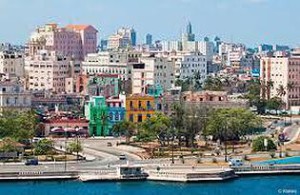
End to the U.S. embargo on Cuba is coming sooner than you think
By Marc Hanson and Sarah Kinosian / Washington Office on Latin America
Over the past year, the relationship between the United States and Cuba has advanced significantly toward normalization. Embassies have been exchanged, agreements on direct mail service and environmental conservancy have been signed, cooperation in law enforcement has deepened, and very soon commercial flights and credit cards may be available. However, after 55 years, the United States still has an embargo on Cuba that restricts trade and heavily regulates travel. This not only hurts Cubans, but cuts against the best interests of the American people.
Only Congress can lift the embargo. Until recently this seemed unlikely, but the tides are changing. Increasingly, the American public is expressing their desire to end trade and travel restrictions on Cuba. The most dramatic shift is evident among Republicans and Cuban-Americans, two groups that conventional wisdom understands to be opposed to normalizing relations. In fact, they are not. Major Cuban-American Republican donors are contributing to the campaign to end the embargo.
Given this new dynamic, it is becoming more difficult for hardline embargo supporters in Congress to ignore their constituencies or the benefits that increased trade and engagement with Cuba would bring to both nations. Here are six signs that momentum is growing in Congress:
1. The American people want this. Polls say most Americans, including the majority of Cuban-Americans, are increasingly in favor of lifting the embargo. Pew’s most recent poll showed 73 percent of Americans, including 59 percent of Republicans, are in favor of ending the trade embargo. Regarding the freedom to travel to Cuba, a CBS News poll found that 81 percent of Americans support ending travel restrictions, including 71 percent of Republicans.
2. There has been a shift among Cuban-Americans. Although Cuban-Americans have historically been the most hardline U.S. population supporting the embargo, the community is changing. In 1991, just 13 percent of Cuban-Americans opposed the embargo. By 2011, 44 percent opposed the embargo. And in 2014, according to a Florida International University poll, 52 percent of Cuban-Americans are in favor of lifting the embargo. In response to the changes in the community new pro-engagement organizations have emerged, including #CubaNow, the Cuba Study Group, Cuban Americans for Engagement and the Cuban American Commission for Family Rights, among many others.
3. There are shifting dynamics in the House of Representatives with increasing support from Republicans. Republicans in Congress continue to add their support to bills that would end aspects of the embargo. The vast majority of Democrats in both the Senate and House of Representatives support ending the embargo on Cuba. Many Republicans in the Senate have supported advancing relations. Last year, Republican Senators John Boozman (R-AR) and Jerry Moran (R-KS) led the way as the Senate Appropriation Committee voted to approve three amendments that would eliminate key elements of the failed U.S. embargo on Cuba. Senator Jeff Flake, Republican from Arizona, has long supported the repeal of the embargo. But more and more Republicans in the House are not only supporting legislation that would lift the embargo, but taking the lead on it. This is a significant change. Examples include:
- The Freedom to Travel to Cuba Act of 2015 allows all U.S. citizens to travel to Cuba (9 Republican backers).
- The Cuba Trade Act of 2015, would allow U.S. businesses in the private sector to trade with Cuba without restrictions (11 Republican backers).
- The Cuba Digital and Telecommunications Advancement Act (Cuba DATA Act), would allow U.S. telecommunications and internet companies to provide services to the island (3 Republican backers).
- The Cuba Agriculture Exports Act, would allow credit to be used for U.S. agricultural export to Cuba and permit U.S. investment in privately owned Cuban agricultural businesses (17 Republican backers).
 4. Those taking the lead in the House of Representatives are committed and energized. Sixteen Members of Congress, eight Republicans and eight Democrats, formed a bipartisan Cuba Working Group (CWG) in December 2015. The CWG will work to promote a U.S.-Cuba policy that reflects the interests of the American people to engage with Cuba. The founding Members include every Republican Member that has authored legislation to eliminate travel and trade restriction on Cuba. According to Congressman Ted Poe (R-TX), a founding Member of the Cuba Working Group, “On an individual basis, Members of Congress are coming around to the idea that we need to develop a relationship with Cuba, a good relationship.” The group recently held its first Member-level meeting and established near-term goals: 1) educate their colleagues and increase understanding of the need to update U.S.-Cuba relations 2) work to pass the same Appropriations provisions that the Senate passed last year to end restrictions on trade and travel with Cuba and 3) build support for legislative initiatives on Cuba that will serve U.S. economic and foreign policy objectives.
4. Those taking the lead in the House of Representatives are committed and energized. Sixteen Members of Congress, eight Republicans and eight Democrats, formed a bipartisan Cuba Working Group (CWG) in December 2015. The CWG will work to promote a U.S.-Cuba policy that reflects the interests of the American people to engage with Cuba. The founding Members include every Republican Member that has authored legislation to eliminate travel and trade restriction on Cuba. According to Congressman Ted Poe (R-TX), a founding Member of the Cuba Working Group, “On an individual basis, Members of Congress are coming around to the idea that we need to develop a relationship with Cuba, a good relationship.” The group recently held its first Member-level meeting and established near-term goals: 1) educate their colleagues and increase understanding of the need to update U.S.-Cuba relations 2) work to pass the same Appropriations provisions that the Senate passed last year to end restrictions on trade and travel with Cuba and 3) build support for legislative initiatives on Cuba that will serve U.S. economic and foreign policy objectives.
In addition, last week former Secretary of Commerce Carlos Gutierrez encouraged the members of the CWG to be aggressive in pursuing an end to the embargo, arguing that keeping it in place only hurts the Cuban people.
5. Congress will have to listen to the growing number of Americans who are traveling, and want to travel, to Cuba. More than 600,000 American travelers visited Cuba in 2015. More than 444,667 passengers departed from Miami alone. While most are Cuban- Americans visiting loved ones, there has been a dramatic increase in non-Cuban-Americans travelers. Roughly 150,000 Americans with no family ties to Cuba traveled to the island in 2015, up from 91,000 in 2014. Demand for hotel rooms, organized trips, and flights is at an all-time high. And many more Americans want to travel to Cuba. If travel restrictions are lifted, an estimated 1.5 million Americans would visit Cuba annually.
6. An organized campaign to end the embargo is underway with new energy and initiatives coming from business, religious, Cuban-American, and human rights groups. There are an increasing number of groups coming out in support of lifting U.S. restrictions on Cuba and they are lobbying Congress to change its policy. The list of organizations deepening their involvement to push Congress to act on Cuba is extensive, diverse, and growing. Hundreds of agricultural organizations, faith-based and religious organizations, human rights, development and policy organizations, as well as travel, academic, and environmental groups want normalized U.S.-Cuba relations.
This week, the U.S. Agriculture Coalition for Cuba, a coalition of more than 100 prominent groups in the U.S. food and agricultural community committed to ending the embargo, visited Washington and talked to their Members of Congress about ending the embargo. The NAFSA: Association of International Educators started the Cuba Engagement Initiative to drive advocacy. Organizations in the travel and tourism industry have jumpstarted educational campaigns. And the U.S. Chamber of Commerce has launched a U.S.-Cuba Business Council (USCBC) to build commercial relationships between Cuba and the United States. These and other groups are planning “fly-in days” over the next few months, in which hundreds of constituents will urge Members of Congress to lift the embargo.
It is true that there are some hardliners on Cuba in key positions in Congress. However, their voices on this issue are increasingly at odds with their constituencies and their policy positions run contrary to what’s in the best interest of our country. Holding on to the embargo is increasingly unsustainable and will not hold. More and more lawmakers are understanding that trade, travel, and engagement with Cuba is in the best interest of both countries and will create jobs, generate capital, improve hemispheric relations, and promote human rights. At some point in the near future, these hardliners are going to have to come to terms with the fact that ending the embargo on Cuba is now not a question of if, but when.
Marc Hanson is a senior associate at WOLA. Sarah Kinosian is a program officer at WOLA.
(From the Washington Office on Latin America – WOLA)

